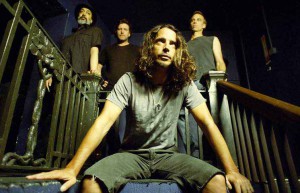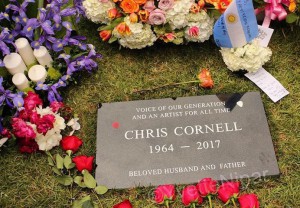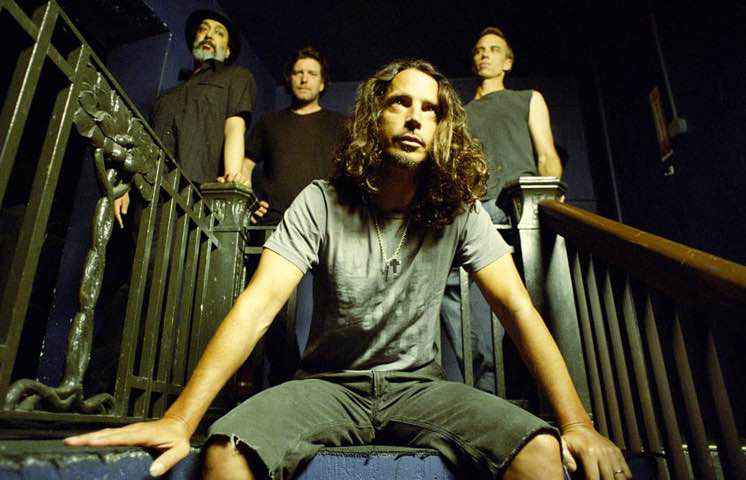So this feels really weird now.
After Chris Cornell’s death back in May, I wrote one immediate article on the subject and then I consciously chose not to write anything more.
This was for the same reason that I chose not to get drawn into all the conspiracy theories and predictable ‘Illuminati ritual murder’ videos springing up on You Tube – I was too upset by the death of one of my genuine heroes and I didn’t want to complicate or infect my feelings any further by opening myself up to all those other things.
It’s much easier to take an objective, dispassionate overview of subjects or cases like this when you’re not emotionally invested in the individual person: but when it concerns someone you really care about or have a strong sense of connection to in your psyche, it is more difficult to stomach all the rabid theories and speculations or to assess the ‘evidence’ at all.
I still feel that way; and I am generally wary of the plethora of Illuminati-centered conspiracy theories/videos that immediately spring up every time anyone vaguely famous dies.
I’m not someone who thinks every death is a conspiracy; and I still probably don’t think Chris Cornell was murdered. But the last couple of days have re-awoken niggling uncertainties.
For the record, I still don’t think Kurt Cobain was murdered either – although I know that belief in the Cobain ‘conspiracy’ is so widespread that for a Cobain fan like me to refute it borders on sacrilege to some people.
However, three days ago I decided to come back to the subject of Chris Cornell’s death and look at more of the information. It had been over two months by now and I felt I could psychologically handle the subject a bit better now; and I knew it was going to be Chris’s birthday, so it felt like the right moment to brave the subject again.
And then – literally as I was starting to look at some of the arguments over Cornell’s death and starting to take some notes – it emerged that the Linkin Park singer, Chester Bennington, had been found dead. The 41 year-old had apparently taken his own life, also by hanging.
He had done so on what would’ve been Chris Cornell’s birthday. Bennington had been close friends with Cornell and had in fact sung at his funeral.

I’m not particularly a fan of Linkin Park as a band; but I always liked Bennington as a singer. What I did like and respect about Chester Bennington was also the respect he paid to his heroes, many of whom happened to also be my musical heroes: people like Scott Weiland (who died in 2015) and most of all Chris Cornell (who he performed with on several occasions, as in the picture above), who he not only became friends with but was even a godfather to one of Cornell’s children.
It has quickly emerged that Chester Bennington had not gotten over the death of Chris Cornell and may have chosen Cornell’s birthday very deliberately as a moment in which to die in the same manner that Cornell did.
I don’t necessarily look at that and suspect a conspiracy or foul play, like some people do – I just see a very sad situation.
It is possible Bennington hero worshipped Cornell, who he might’ve seen not just as a friend but as an older brother figure. I made the point in my initial article after Cornell’s death about how much of an older brother figure Cornell seemed to be all along, going right back to the early Seattle scene and his relationships with Andrew Wood, Eddie Vedder, Jeff Buckley and others, all of whom seemed to benefit a great deal from his presence.
Kurt Cobain even once said he formed Nirvana because of Soundgarden. And Eddie Vedder in fact talked about Cornell as his ‘big brother’ at a show in London shortly after Cornell’s death.
All of this being said, the timing and manner of the Linkin Park singer’s death (particularly as I was finally coming to write another piece about Cornell’s death) served not only to re-awaken all the sad feelings I already had over Cornell’s death, but also to plant a further seed of doubt in my mind as to whether there maybe is more to all of this than meets the eye.
I go down this path reluctantly; not with any kind of enthusiasm.
The fact that Cornell didn’t leave a suicide note (it is being reported that Chester Benington didn’t leave a note either) isn’t necessarily suspicious in itself – lots of suicides don’t involve notes; actually, I would suspect that most don’t involve notes.
And a lot of people have pointed out how unlikely it is that he would’ve killed himself (1) right after a big show, (2) during the middle of a massive tour, (3) when a highly-anticipated new Soundgarden album was about to be recorded, or (4) when he was apparently settled and happy in his family life, with young kids.
The problem with this line of thinking, however, is that it assumes that suicide or depression are logical things that follow a logical course: which is simply now how it works.
Things that we might think *we* would be over the moon about (new album, huge tour, permanent rock legend status, etc) are only us looking in from the outside, but with no real sense of what it meant to be Chris Cornell. It’s worth remembering that Joy Division’s Ian Curtis – who also committed suicide by hanging (in 1980) – killed himself on the eve of that band’s big American tour; a tour that was going to represent the Manchester band ‘breaking America’.
In fact, in another jarring bit of symbolism or coincidence, Cornell’s death occurred on the anniversary of Ian Curtis’s death (May 18th 1980, May 18th 2017).
What’s curious to me is that, even as someone who never knew or met Cornell personally, what I wrote after his death (specifically that he had always seemed to me like the guy that had his shit together and wouldn’t fall the way so many of his contemporaries have done) has also been said by a number of people who did know him personally.
For example, several people interviewed in this Rolling Stone piece say basically the same thing, including Jerry Cantrell from Alice in Chains (Soundgarden’s fellow Seattle pioneers/giants; and who’s own extraordinarily gifted frontman, Layne Staley, fell to a drug-related death in 2002, aged 34).
Cantrell says Cornell was “the last guy in the world I thought that would happen to. That’s not the way that book was supposed to end. And it was not the way that book was going.”
Others who knew Cornell – including fellow musicians who’d been around him in the weeks before his death – are also quoted in the same article, saying they were stunned, and talking about how busy Cornell was with projects, albums, touring, side-projects, film soundtracks and more, and how many plans Cornell had that he was excited about.
Some people, again, will look at stuff like that and cite it as indication that Cornell wasn’t depressed or suicidal: but, again, the problem is in trying to apply strict logic to something that isn’t always logical in nature.

But there are some suspicions about Cornell’s death that have come from people other than mourning fans or suspicious conspiracy theorists.
Aside from questions about accounts of times and chronology (which in themselves aren’t convincing enough to make a case), the ‘death scene’ photos that were released (and which I haven’t and won’t look at) were examined by a forensic pathologist who thought it was problematic how much blood there appeared to be for a hanging. Dinesh Rao, who claims to have conducted over 12,000 autopsies, told International Business Times “It’s very unlikely such large amount of blood found in a case of hanging.”
A former medical examiner in Michigan also reviewed Chris Cornell’s autopsy report and has said he is ‘not absolutely convinced’ that Chris Cornell killed himself. Dr Werner Spitz – a forensic pathologist – argues that the position of the body wasn’t suggestive of suicide. Spitz doesn’t say he suspects foul play, but rather that it may have been an accident.
These observations from professionals would seem to justify us questioning the story, even if we don’t necessarily come to the conclusion that any kind of conspiracy was involved.
A lot of frustration and suspicion was also caused by the long delay in releasing toxicology reports and a Freedom of Information Act request for “reports relating to Chris Cornell’s death” being denied by the City of Detroit Law Department for a long time.
There have been claims going around that Cornell was about to expose a child sex ring that involved A-list Hollywood stars and elite politicians – and that he might’ve been targeted for that reason.
These claims, as far as I can tell, are unsubstantiated and are pure speculation; which invites the suspicion that they’re simply motivated by a lot of people’s obsession with ‘Pizza-gate’ theories and VIP pedophile rings.
Chester Bennington’s death, predictably, is immediately being cited by some of the same theorists as another murder, directly relating to Cornell’s death; the claim is being made that the Linkin Park singer had found out something about Cornell’s death that he might’ve been about to expose.
Again, there’s no solid evidence for any of this – just speculation.
However, I will acknowledge a couple of things that do provide *some* food for thought; one being the fact that Chester Bennington appeared to have previously said he had been sexually abused as a child, another being the fact that Chris Cornell had set up a foundation for helping vulnerable children. This has prompted some people to jump to the conclusion that Cornell – via this charity – might’ve come across evidence of elite child-abuse activity.
Again, there isn’t any solid evidence for this – it’s really just a case of taking interesting, though (probably) unrelated, bits of information and linking them together.
But, as much as I probably don’t buy the theory, it does keep coming back into my head – but that’s probably because the idea has now been planted in my head. Cornell’s charity (with his wife, Vicky) was, according to one of its listings, ‘based on their personal experience working in the child protection space’.
Interestingly, the brilliant Stone Temple Pilots frontman Scott Weiland (who died in December 2015) also revealed in his biography that he had been raped as a child. I don’t believe that Weiland’s sad death had anything to do with this subject; but, again, little revelations like this do tend to stick in your head and make you wonder about things.
But it’s still more of a splinter in the mind at this stage than a genuinely convincing case to be made. For a proper ‘conspiracy’ case to be made, there needs to be better supporting evidence – and I just haven’t seen that from anyone yet.
That doesn’t mean the case can’t be made; or that more evidence won’t emerge.
Which, for now, leaves us with either a premeditated suicide or a tragic accident.
As with Cobain, a lot of Cornell’s lyrics and themes over the years – as well as comments he made in interviews over the years – have overtly touched on suicide; and in Cornell’s case, particularly on the imagery of hanging. In fact, a number of Soundgarden’s very best songs touched on those themes; the lyrics of 1996’s ‘Blow Up the Outside World’, for example, are dominated by haunting lines (“nothing seems to kill me/no matter how hard I try” and “Nothing can do me in before I do myself”), while ‘The Day I Tried to Live’ has generally been perceived as a song about being brave enough to take your own life.

Among other songs too, the opening single – and opening track – from Soundgarden’s seminal Down On the Upside album was ‘Pretty Noose’ (which, if you read the lyrics to the chorus and then think about how Chris died, will make your hairs stand on end).
Like the best of his contemporaries – Cobain and Layne Staley in particular – he tended towards dark, even bleak, imagery and lyricism a lot of the time, even when his actual singing was at its most beautiful. Even on the night of his death in Detroit – during what would turn out to be his final concert – he chose to end the show with ad-libbed verses from ‘In My Time of Dying’. He was also reported to have told the audience “I feel sorry for the next city”.
None of this proves that Cornell took his own life – or that he was always going to take his own life – but it does, just as with Cobain twenty years ago, leave us with an impression that the idea of going out that way has been in his psyche for a long time.
What I’m personally still leaning towards is that Chris Cornell may have killed himself in a state of confusion, possibly caused by the medications he was on: essentially, that he wouldn’t necessarily have done that or been ‘suicidal’ in the clear light of day, but lost himself to a moment of confusion or instability.
And Chester Bennington may have simply been unable to cope with Cornell’s death and decided to follow him.
We knew from the day after his death that Cornell’s wife didn’t think he was suicidal or depressed. Her suspicion was that specific anti-anxiety medication he was on had caused him to do what he did and that he may not have been entirely lucid or in control of himself when he did it. The drug ‘Ativan’ has apparently been linked to causing suicidal thoughts before.
Not that I trust the testimony of Vicky Cornell: but talking about her here will open up a whole new rabbit-hole.
It was reported that, during his phone conversation with his wife on the night he died, he admitted that he may have taken too much Ativan and was repeatedly saying “I am just tired” before abruptly hanging up.
I’m still not a hundred percent sure I have a definite opinion about what the truth is: but the theory that he simply acted in an unstable moment (influenced in part by imbalances from a mix of medications) is the thing that currently seems to make the most sense and fit the available ‘evidence’.
In many ways, that’s much sadder than if he had killed himself wholly deliberately.

But I admit there are some doubts in my mind. And probably always will be. The truth is that we will probably never know for sure.
As a lifelong fan of Chris Cornell, my better judgement is to leave the matter of his death alone and just stay focused on his music and his cultural legacy; but, admittedly, some of the doubts and suspicions that have been raised will probably continue to haunt me, as it will many others.
In the same Rolling Stone piece I quoted earlier, Alice in Chains’ Jerry Cantrell says of Chris Cornell, “Nobody else sounds like that guy. Nobody will.” On Cornell’s death, which Cantrell appeared confused by, he said “There is a space now and forever empty because of that. It’s never going to make sense. It’s never going to feel right.”
That’s, unfortunately, the truth: it’s never going to feel right. There’s always going to be niggling doubts or questions, and it is always going to be uncomfortable to think about.
Read more: ‘Mourning Chris Cornell – An Ode to His Gift & Our Good Fortune‘, ‘Scott Weiland: A Confused Goodbye to a Rock n’ Roll God‘, ‘A Remembrance of the Otherworldly Shannon Hoon‘, ‘Nevermind the Bollocks – Here is the Real Legacy of Kurt Cobain‘…





Hm Cris found out Foundation money gone,Hm Vicky and Courtney were friends who was at service vaping like a hog,Hm Cris found out was about to divorce her ass,Hm Vicky instantly lost her Cornell name,then sued Band,Hm locked out Band of all social media,Hm bodyguard disappeared to Siberia gone forever hmm all SA PIS busted same time frames ,Hmm Some of use won’t ever Stop finding out the Truth!!! Cris deserves Justice and Peace not violently endied his spirit here in Seattle is with me every DAY
I understand. I accept all that. I need to revisit this in more depth: I just find it emotionally difficult, because of what Cornell and Soundgarden mean to me.
The lyrics of Chris’s last song, “When Bad Does Good,” are flat-out eerie. People and the press were quick to castigate Randy Quaid as crazy when he asserted that there are Hollywood death squads. Sure, Randy is an oddball, but in my opinion, the idea of large Hollywood conglomerates ordering hit jobs on artists who are not bringing in the money like they used to in order to reap financial gain from insurance policies is not that far-fetched. Hell, people kill other people on a daily basis for a lot less.
You know, I’m not going to dispute you on that. I’m really 50/50 on whether Cornell took his own life or not. I struggle with it. You mention ‘When Bad Does Good’ – but have you ever seen the video for the Cornell song where he is shown being set up for execution via a noose and then somehow escapes? Talk about eerie.
Its not about medication at all. I ve read the tox report, i ve showed it to 2 pharmacists and 2 doctors. No overdose, no illegal drugs, just pills under prescription, small dosages! Not to mention that the autopsy report shows the verdict: the pills didn t contribute to the death. Coroners must know better. Lets not speculate. Please dig a way more about the reports before writing. He didn t abuse any pill.
Hanging is a hell of a way to commit suicide. It’s not instantaneous, and it might fail. I’m always sceptical when I hear someone has hung him/herself. There are quicker and easier ways.
I see your point, Helen B. But it looks like the mix of medications he was on might’ve messed up his thinking/judgement. That’s the best guess as to what happened.
This is rare writing. Proper, up on the music, with penetrating yet measured analysis. Would be in an NME, if had freedom and balls. Like the surprising take on Corbain (– ne’er go with the flow, you). With Cornell or other unexpected suicides and ‘accidents’ can’t but be always suspicious. Sure, no ‘strong evidence’ but there was some talk of his campaigning for justice and child abuse or something – this rings d’alarms. Deserves to be read by muzos and twoffers. Here on BBB they meet. Thanks.